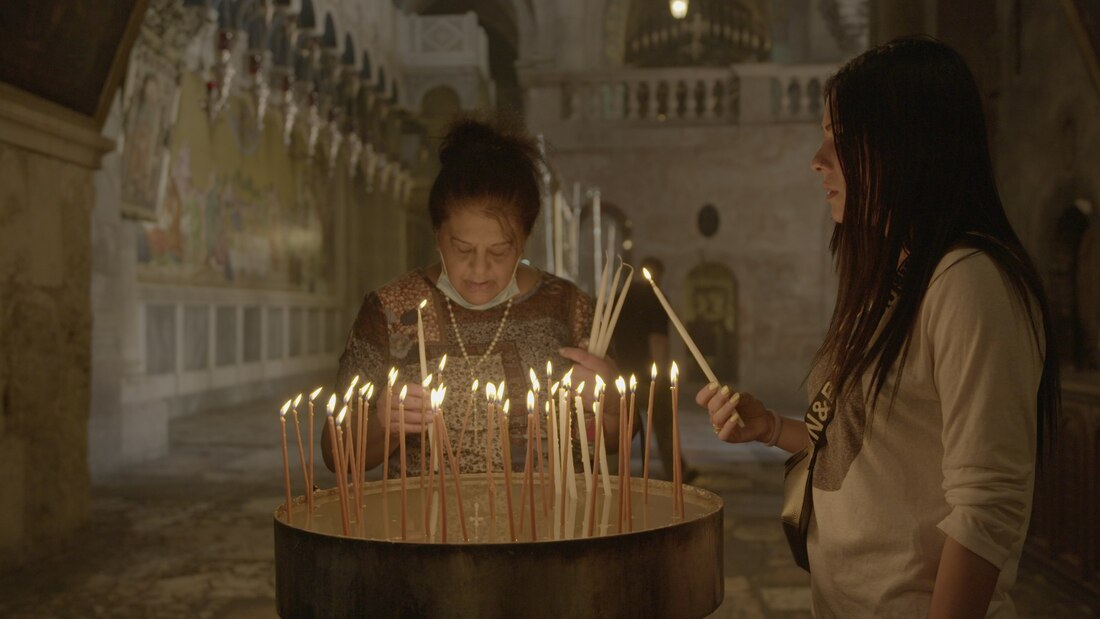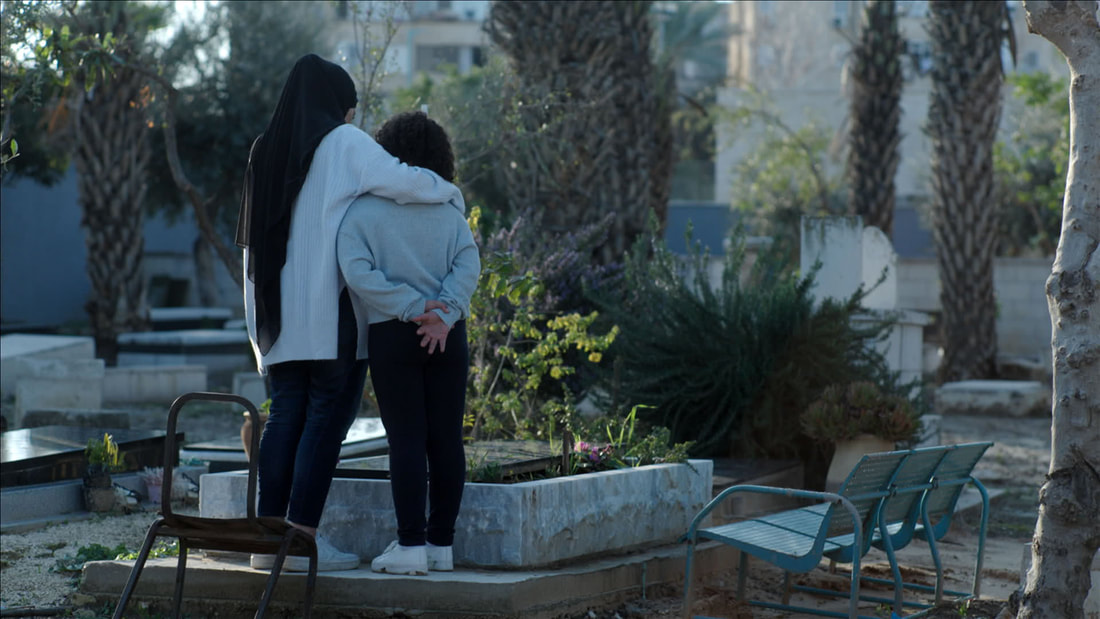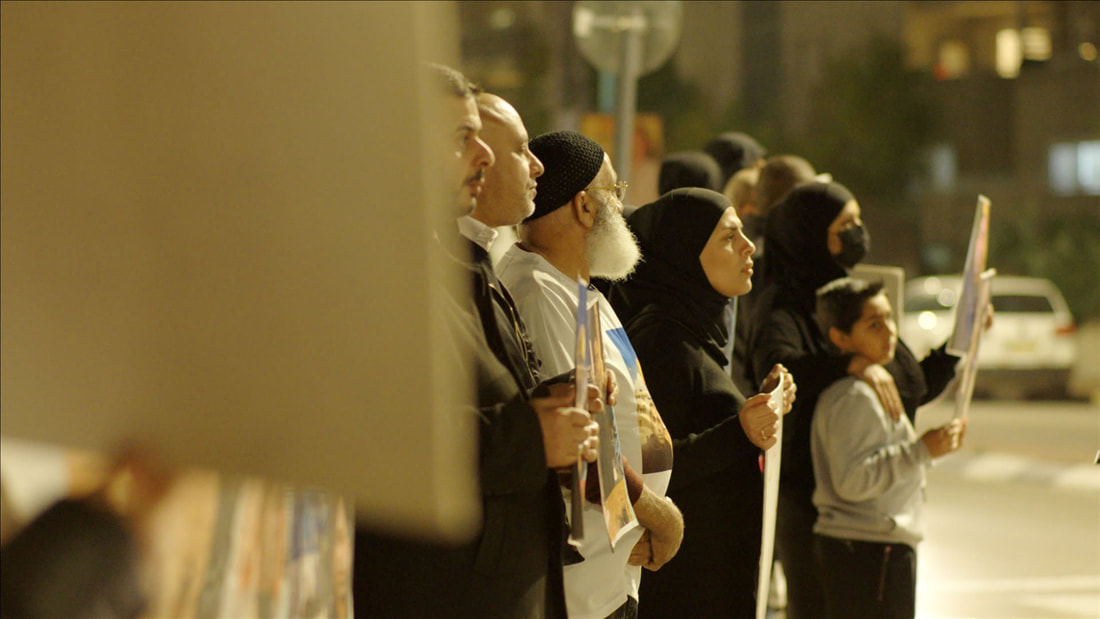|
Review by Daniel Lima Mourning in Lod opens with text informing the audience that the city of Lod — Lydda to the Arab residents — is one of the "mixed cities" of Israel, with a large population of both Jewish and Arab Israelis. Absent from this context is why this is the case: while the city had an Arab majority for over a millennium and was included in the original UN plan for the state of Palestine, the city was annexed by Israeli forces in 1948, killing hundreds and expelling tens of thousands of Arabs from their homes. Whatever the intentions of director Hilla Medalia, this sets the tone for the rest of the documentary, a human-interest story that ultimately reveals more in what it omits than what it shows. The film charts the story of three families brought together by civil unrest in May 2021 during a period of intense conflict between Israel and Palestine. Musa Hassuna was an Arab Muslim citizen who was killed while walking home by an Israeli settler; Yigal Yehoshua was a Jewish Israeli citizen who was killed while driving home by an Arab protestor. Yehoshua's organs were donated, and his kidneys went to Randa Oweis, an Arab Christian citizen. Through interviews with the families and following them in the wake of these tragedies, the film explores the emotionally charged atmosphere of Lod/Lydda and laments the pain it takes to bring people together. While the film positions itself as an exploration of the city through this unique microcosm, it is first and foremost about these three families that found themselves connected by chance or fate. Their testimonies are indeed moving, a mix of anger, sorrow, and appreciation for the people in their lives and their community, as volatile as it might be. These moments are when the film is at its best, capturing the void that the death of these two men has left, as well as the new lease on life afforded to another. To give credit where it's due, Medalia doesn't shy away from the disparate realities that the Arab and Jewish families experience in Israel. Most of the scenes with the Hassuna's family center on the protests led in the aftermath of Musa's murder, with his killer's plea of self-defense accepted by Israeli authorities. Meanwhile, the entire Arab community feels the pressure in the aftermath of Yigel's murder, and the accused are quickly rounded up and held awaiting trial for years. There is a clear empathy for the struggles of Israeli Arabs. When Musa's father furiously attests to how little the government cares for people like him, it feels every bit the unvarnished truth as the moments where he cries over a son taken from him far too young. It's a commendable thing to include in a documentary such as this. That being said, in rooting its own perspective on the conflict within the experience of these families, Mourning in Lod creates natural limitations in how much insight it actually has to offer. As marred by tumult and tragedy as this story is, it still ultimately is portrayed as something of a silver lining. There are scenes of the various members of the Hassuna, Yehoshua, and Oweis families interacting with each other, expressing their dismay at the state of their city, being genuinely appreciative of each other's company, and joining each other in their grief. Though the film is frank about the systemic discrimination faced by Arab Israelis, it stops short of giving voice to any solutions or even simply singling out an ultimate culprit for the discrimination. The plight of these people is acknowledged, but only as part of a larger cycle of violence, a heinous evil with no perpetrator. If the film was actually an impartial observation of these people and the lives they led — or at least adopted the veneer of impartiality — this could be excused as a consequence of adhering to the subjects' worldview, that they themselves see the conflict as something bigger than them and impossible to seek an end to or redress for. Putting aside that this does not seem to be the outlook of at least one of the families, this is a movie that uses the cinematic form to create a certain vision of reality. This is a slickly produced doc, clearly shot with an intention that goes beyond the capabilities of merely capturing candid moments. The images are skillfully composed, attention is paid to lighting and how people are positioned within the frame, and the score loudly announces to the audience what they should be feeling at any moment. Most egregious, however, are the scenes that are clearly staged. When the Oweis family shows up to Yigal's sloshim, they do not immediately leave their vehicle and must be coaxed out by his brother. It's a moment that might be heartwarming if one doesn't stop to think about how the camera crew had the foresight to set up both in the car and outside it for a proper shot/reverse shot. When Musa's widow visits his grave with their daughter and tearfully tells the child to speak to her father and promise to become a doctor, it's hard not to look at the tight, carefully composed shot of their faces together and wonder if they've been coached on what to say by the filmmakers for a scene that would be perfect for the movie. Similar scenes litter the entire runtime. Perhaps these moments were completely natural, with absolutely zero input from the production team. The point is that they don't feel natural; instead, they come across like the filmmakers utilizing the language of cinema to present a heightened version of reality. It's certainly no crime for the director to make something cinematic. Still, the manufactured quality of these moments calls attention to the role of a director in a project such as this. This begs the question: Why this heightened version of reality?
Why, in a city whose violent and forceful annexation by a colonial power is still within living memory, with a history of systemic discrimination and far worse against citizens within borders both disputed and undisputed, would one choose to tell a story with no ultimate sense of resolution or justice? Why is that oppression the backdrop to a personal story of unity, a borderline feel-good narrative that does not reflect the environment that it sprung from? With so many stories that speak to the struggle of the citizens of Lod/Lydda, why tell this one? Mourning in Lod is a film that genuinely seems to have its heart in the right place, full of empathy and a genuine love for these people who were able to transcend division and find some small measure of peace among each other. That said, it fails to provide a broader critique of the conditions that so dramatically affected the lives of its subjects, nor does it ever articulate a thesis for what this story has to say about those conditions. If we are to accept that there is a real power in documentary filmmaking to expose the truth and say something of substance about the world, then a film that so studiously avoids taking a stand can only be seen as a disappointment. Mourning in Lod premieres in theaters April 19, and arrives on Paramount+ May 17. Rating: 2.5/5
0 Comments
Leave a Reply. |
Archives
July 2024
Authors
All
|
|
|
disappointment media
Dedicated to unique and diverse perspectives on cinema! |



